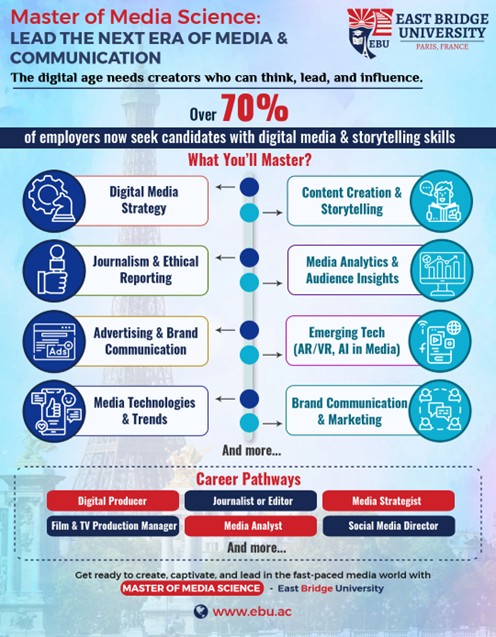The media landscape has undergone a deep-seated transformation. Traditional media like newspapers, radio, and television now coexist with digital platforms such as social media, streaming services, blogs, and podcasts. As consumer attention fragments across platforms, media management has developed as a key discipline—balancing content strategy, digital tools, and audience understandings.
1. What is Media Management in the Digital Age?
Media management states the planning, execution, and oversight of content across various channels, ensuring it reaches the right audience at the right time. Nowadays, a degree in communications and media is getting popular. In the digital age, this includes:
- Managing social media platforms
- Monitoring digital campaigns
- Analyzing audience engagement
- Optimizing content for SEO
- Using data analytics to guide decisions
It’s no longer about broadcasting to the masses, now it’s about engagement, personalization, and timing.

2. The Rise of Data-Driven Content
Data is at the heart of media management. According to Statista, 90% of marketers use data analytics to track content performance and shape strategies. From Google Analytics to social media insights, managers now rely on real-time data to:
- Understand audience behavior
- Identify trending content
- Optimize publishing schedules
- Improve ROI on digital campaigns
Without data, media strategies risk becoming blind shots in the dark.
3. Multi-Platform Approach: Meeting Audiences Where They Are
Today’s consumers move effortlessly between devices and platforms. 57% of content is consumed via mobile devices (Insider Intelligence, 2024). A vigorous media management strategy includes:
- Platform-specific content adaptation
- Consistent brand voice across channels
- Responsive formats (video, reels, blogs, etc.)
- Real-time interaction and community building
Cross-platform adaptability is no longer an extravagance, it’s a necessity.
4. Crisis Management and Reputation Monitoring
In the digital age, news spreads fast, particularly the negative kind. A mistake can go viral in minutes. This is where media crisis management becomes so crucial. Media managers are now responsible for:
- Monitoring brand mentions and sentiment
- Responding to negative press or customer feedback
- Issuing timely public statements
- Maintaining transparency and trust
Tools like Meltwater, Brandwatch, and Google Alerts are now staples in a digital media manager's toolkit.
5. The Growing Role of AI and Automation
Artificial Intelligence is streamlining media operations. According to McKinsey, AI can automate up to 45% of media-related tasks, including:
- Content scheduling and distribution
- Audience targeting
- Personalized recommendations
- Trend analysis and predictive insights
While AI boosts efficiency, the human touch in creativity and emotional resonance remains irreplaceable.
6. Skills Essential for Modern Media Managers
Today's digital media manager wears many hats. Some essential skills include:
- Strategic thinking – Aligning media plans with business goals
- Tech expertise – Understanding CMS, analytics, SEO, and automation tools
- Crisis communication – Staying proactive in high-pressure situations
- Storytelling – Crafting messages that resonate emotionally and logically
Media professionals can adapt to evolving technologies and audience behaviors with a Master of Media Science.
7. Challenges in Media Management Today
Despite its potential, digital media management faces unique challenges:
- Information overload – Cutting through noise to gain attention
- Algorithm changes – Keeping up with constant platform updates
- Privacy laws – Navigating data regulations like GDPR and CCPA
- Fake news – Combating misinformation and ensuring credibility
Media managers must be agile, informed, and ethical.
Navigating the Future of Media Management
Media management in the digital age is both an art and a science. As technologies evolve and audiences become more selective, professionals must adopt adaptive, data-driven, and ethical approaches to stay relevant.
From building brand trust to delivering real-time engagement, media managers are at the heart of the digital revolution, shaping not just messages, but the future of communication itself.
Written By : Tammy C. Bow




